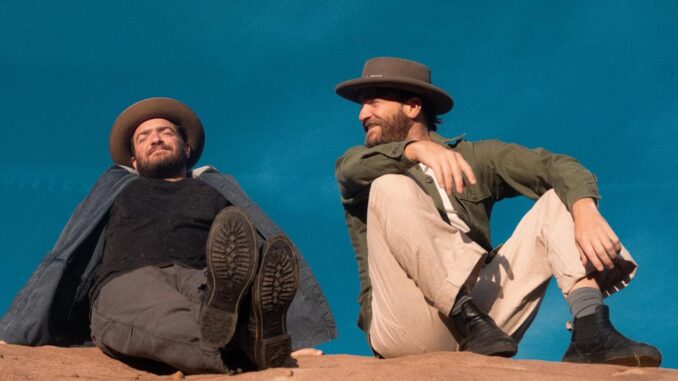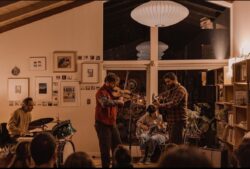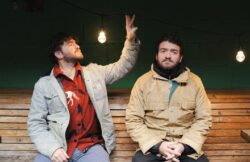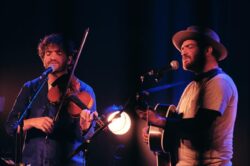
This interview took place just before The Brother Brothers left the US for a tour in Australia, which was cancelled when David Moss passed out while swimming in the surf and nearly drowned.
You know we’ve got to find a way to bring some understanding here today.
“Of everyone that’s come outside, To walk these streets and roads,” The Brother Brothers sang on ‘Supermoon,’ a track from their fourth album. “We all saw the face of a man, Who would stand upon another man, I’ll never seem to understand, What makes a heart so cold.” Seen on a lyrics sheet, these words feel ominous – slightly haunting, even – and yet, when sung in sweet harmonic unison by David and Adam Moss, they’re somehow soothing and comforting for the ears, the mind, and the heart. It’s a fitting way for The Brother Brothers to continue their career, not to mention one of the strongest songs on a very intimate record. “The January Album” is soul-stirring, cinematic and an achingly raw missive to loss and reconciliation, connection and catharsis.
Asked during a Zoom interview if they saw the album as a hopeful offering to turbulent times, Adam Moss answered: “I would call the songs introspective. When you’re being introspective, there’s hope as well as despair. You can’t have one without the other. I think that threads the needle very well.”
The album greets you like an old friend as the brothers’ joined voices effortlessly mingle together over jaunty melodies of the folk-inflected, singer-songwriter species, undeniably intimate, feeling like a cool breeze in summer or a warm blanket in winter. Everything from the tempo to the arrangements to the tone has been engineered, allowing the songs of melancholy and caring to not only be maintained but to feel heightened, to take centre stage.
“It is a very collaborative effort as far as the songs go,” David Moss asserted. “Both of us brought many ideas to the table, and we finished almost all of them together. At the beginning, I had an arsenal of songs that we worked up to be ours, and Adam would write one here and there. But in an effort to get along and not get into arguments, we kind of tiptoed around working together when it came to that really intensive creativity, just because it’s hard to talk about something. Some things are just black and white; and some people want black, and some people want white. It’s just hard to find the grey in the middle.”
The production shifted from Bear Creek Studio in the state of Washington to Montrose Studio in Richmond, VA, and the colours seem more expansive, but the intimacy is preserved. It brought a concise voice to their music.
“We were lucky to have a full month in the studio to workshop some unfinished material,” David said. “Part of what made it collaborative is that we had other people there that were able to act as what you might call mediators. Bridget Keamey, who produced it, was really good about steering things in the right direction and being a third voice. Just having the time and silence and space and not being in a hurry helped. Most albums usually you’re just running through money every time you go into the studio, so you don’t have time to just relax and finish songs the correct way, by trying out ideas.”

Adam continued the thought: “The main reason that we didn’t go back there is we’ve been wanting to work with this engineer named Phil Weinrobe for a long time, and he finally had an opening at the time that we made the album. Sometimes, the universe just lays out a path for you that is so obvious. We feel incredibly lucky to have worked with Phil, and the proof is in the pudding. The results are there to listen to. Also, John Fatum, our drummer, could make it for that month. All of those things lined up in the perfect way.”
Sharing lead vocals, additionally, the Moss twins make use of assorted instruments, including bouzouki, harmonium, pump organ, and fiddle. The result is a sequence that underscores the duo’s songwriting skills and their enduring chemistry. Adam writes songs on fiddle, banjo and piano, whereas David does 90 per cent of his songwriting on guitar, with the rest on cello.
Born and raised in Peoria, Illinois, music was always a part of their lives. “We were singing since before we had memory, I’m pretty sure,” David remembered, “but there’s a lot of videos of us, so I’m not sure what’s memory from watching the videos or what’s actual memory. But we were always singing and started playing piano at five.”
Peoria is a nice town, but it’s hardly the music capital of the country, not even Illinois. How long did it take them before they moved away? “It was what you might call immediately,” Adam retorted. “The town doesn’t have a bad reputation or anything, but it’s known as a place of mediocrity. It’s really nice to go back and be with our folks, though, and just be around. It’s a really easygoing town.”
They wrote about their hometown in ‘The Illinois River Song.’ Growing up in a river town in the modern era still has remnants and hints of the past. “Traditional commerce was always done by the river,” Adam offered. “Our hometown was a Caterpillar (inc.) town and was a litmus test for the health of the greater economy. When the layoffs began, there were always lost souls.”
“In college, we attempted to find ourselves, which doesn’t always happen correctly,” David added. “Adam found bluegrass and went with playing fiddle. I was more like a jazzhead. Of course, our roots brought us back together. At 25, I became a songwriter, and we moved to Austin. I didn’t even play guitar when I moved there, but that town will have an effect on you. Adam never really got into that, but he did write songs.”
From there, the brothers moved to Boston and began busking around the city. They went to Brooklyn, then ended the 10-year period in the Northeast US when both moved during the pandemic. Adam’s move to California was influenced by his then-girlfriend, who was staying in Santa Barbara. David and his fiancée travelled in a camper before settling in Florida. At first, it felt strange being apart, which is reflected in the opening song on the album.
“The song is called ‘Lonesome’,” David said, “which I wrote over a long period of time while I was traveling. And it encapsulates that period of time in this really interesting way. It speaks to the desert and the kind of like zoomed-out trip that I was on at the time. Adam wrote a song called ‘Cedar Branch’ that’s just all stream of consciousness, and it’s awesome.”
“It speaks for itself,” Adam explained. “It starts out as a scene in the ground, and then all of a sudden, we’re talking about a sneeze guard at a café. Just letting the story travel wherever it wants to go. I don’t know where it came from, but there it is.”
Always drawn to travel and exploration, they often write about the open road or pen homages to people they’ve met and who have had lasting effects on their lives. In the song ‘Comes and Goes,’ the speaker sings: “Boy, you gotta find religion. It’s not in a church or building. It’s out along the highway.” David relates, “The song isn’t necessarily about someone in particular as much as it’s about how sometimes you can’t truly find what you need until you’ve been out looking for it and realized that it’s been right there all along.”
David is the less comically freewheeling half of the folk/americana group, usually playing the straight man to co-lead singer/co-harmonist Adam. Fans of this sometimes-sparring duo know when they speak, there is a 50/50 chance they are simply following a brainwave of improv rather than relaying concrete information. Still, amid their wiseacre chatter, genuine wisdom emanates. They possess superb self-awareness and an irresistible curiosity for the human condition, something which is expertly captured in “The January Album.” This album is described as a distillation of the modern American spirit, reflecting the Brothers’ unique outlook on the world and their experiences.
Talk to me, so you can see.
They can be playful at times, as in ‘Brown Dog,’ one of Adam’s contributions, which recounts the praises of man’s best friend and takes the mickey out of man. The song makes a farce of our over-reliance on and fondness for our electronic devices, humbling the listener via a happy, bouncy tune. “Grown man, you’re an animal. Why you starin’ at your phone? Is it better than being alone, with your thoughts for even a moment, if you don’t have to?”
Speaking from his car on some crowded California freeway, Adam displayed a knack for trenchant quips that cut folks down like a combine harvester. Asked if there was anything to both twins being given biblical names, Adam cracked wise, “I think it’s part of being Jewish. I was going to say something sarcastic.” Playing along, I brought up that in the bible, it was Adam who sort of screwed humanity while David had the better reputation, being a shepherd to a King and uniting the tribes of Israel, to which Adam bantered: “It’s very common for generals to unite humanity and leave the world a better place. Sorry, that was sarcastic.”
It requires finesse to pull off teasing and preaching, and the brothers have a good supply of that. When asked about the usual comparisons – The Everly Brothers, The Mamas and the Papas, Simon & Garfunkel, though definitely not The Blues Brothers, David asserted, “We can play the blues.”
Well, how about The Smothers Brothers in rhyme and performance? Any cosplay? The answer: “A little Smothers Brothers, maybe some Alan Sherman.”
Did mom always like one of you best? “She couldn’t decide. How could you pick?”
Which one is Tom, and which one Dick? “We’re both dicks,” was Adam’s rejoinder. Then, “No, David, you’re Dick.”
As you might expect if you’ve seen some of their live clips, the brothers are great storytellers.
“One of the things we like to do at a show when the crowd is warm and personable and we’re feeling comfortable is to have a whim,” Adam said, warming up to the topic. “Like in Colorado, we want to go skiing. In Australia, go surfing. Sometimes, we’ll just ask for random things. When we were in Aspen, we asked for hats, and some lady said, Yeah, I’ll buy you hats. These are like $800 hats. And this lady bought them for us.”
“And we wear ’em all the time,” David agreed. “They’re real cool hats.”
Adam continued: “One of the most fun things about doing what we do is being able to have a platform and just ask for what you want. I am living in LA. When the fires happened, we were at our show in Chicago. I just asked people for money, and we raised $2,200 for fire relief.”
David took his turn, saying: “I recently moved to Miami and wanted to learn how to sail. I told the audience about it and made a really great friend. He’s like 70 years old, and we go sailing all the time. After taking me out a few times, I knew so much about sailing that now, I could probably do it on my own even though I never have. I know all the words. I know all the things you’re supposed to know about sailing, all thanks to just having a little talk on stage.”
Their first recording was called “Tugboats,” a 5-song EP recorded in a single-room studio on the Upper West Side of New York City, and was quickly followed by a full-length album called “Some People I Know.” David often refers to this one as “the album that was the culmination of everything that had led us to form the duo.” In 2021, “Calla Lily” was released, followed by a self-produced collection of covers, which was made to fill out the terms of a recording contract.
‘Calla Lily Song’ harkens back to the time the brothers lived in Brooklyn on the corner of Myrtle and Knickerbocker in Bushwick. “Well, that is where I paid my dues, And everyone checks out your shoes, Oh man, it’s hard to shake the blues when you got ‘em.” Their favourite song on that album – although Adam claims to hate agreeing with David – is ‘On the Road Again,’ though not the Willie Nelson song of the same title. “I will do just about anything to travel and see things, find new people and see old friends,” David enthused. “I guess you could say I’m a very social person to the point where I drive for hours just to go hang out and have some good times. I think Adam’s very much the same way.”
“We play ‘On the Road Again’ at every show,” Adam said. “What I like most about that song is that when I’m having a hard time on the road, that song really speaks to me. And when I’m having a good time on the road, that song really speaks to me. And when I’m just kind of chilling, that song also speaks to me. I can always find some meaning, and that’s nice.”
From David’s perspective, ‘On the Road Again’ just popped out of him like a muffin from a toaster. “I was questioning why I even was writing songs, what I was doing, what was my motivation for being an artist. This is stupid. Why don’t I just go do something where I can be home all the time instead and have a life? I’m just chasing people’s ears so I can play in front of them. That song was my wake-up call.”
That begs the question of what is the brothers’ process for writing? Where do they get song ideas from typically? Is it from reading something, watching, listening to people?
“It’s usually banging your head against the wall until something pops out,” said David, again with the toaster reference. “It’s always different. Sometimes, you get really frustrated and realize that you’re doing the same thing over and over again, and you need to change it up. So different rooms, different books, different music, different walks, different paths, different everything.”
Adam allows for the use of a different part of the brain. “It does feel like you’re speaking to a higher power, but if you’re not constantly visiting that area of the brain, trying to feed it or inspire it, it’s going to be less productive. You can’t just do your taxes and then write a song. Well, you can, maybe, but the more you’re visiting that space, the more inspired you are to have something strike.”
However it is done, and whatever they are doing, The Brother Brothers are doing something right, being honest and taking stock of their lives in the thick of whatever personal stuff is going on. The spark is keeping the material and, as a result, themselves fresh and sustainable. As it is succinctly put in their promotional materials, they have a unique outlook on the world that comes from visiting every nook and cranny of the US.
“We’ve definitely been to a lot of nooks and crannies,” David concurs. “But there’s a lesson to be learned in each song, and we’d love for more people to have a chance to hear them.”


